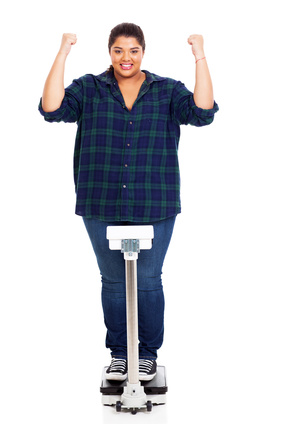 The evidence seems to be stacking up that if you’re trying to lose weight, the more frequently you step on the scale the more weight you’ll lose.[i],[ii],[iii],[iv],[v] The most recent study was the first randomized-controlled-clinical-trial to address the question of self-weighing and weight loss.[vi]
The evidence seems to be stacking up that if you’re trying to lose weight, the more frequently you step on the scale the more weight you’ll lose.[i],[ii],[iii],[iv],[v] The most recent study was the first randomized-controlled-clinical-trial to address the question of self-weighing and weight loss.[vi]
Weighing yourself daily may be optimal…
Subjects that weighed themselves daily lost three times more weight over six months compared to participants who weighed themselves an average of 5.2 times per week.
That’s seriously impressive. Daily weighers lost 20.2-pounds over six months compared with 6.8-pounds for those who stepped on the scale “only” 5.2 times per week! What really stands out about this data is that the non-daily weighers still weighed themselves on most days, but lost only a third as much weight as the daily weighers.
Why would weighing yourself more frequently improve weight loss? Behaviorists theorize that self-monitoring behaviors (self-weighing; food or activity logs) increase your self-awareness of your actions and your focus on your goals. Which in turn promotes greater adoption of the diet and activity behaviors associated with successful weight loss. This assumes (as was the case in this recent study) that you are aware of, and directed toward, evidence-based behaviors that facilitate creating a calorie deficit for weight loss.
Behaviors daily weighers in the study reported doing more often then less frequent self-weighers (statistically significant differences):
- Reduced caloric intake by 500- to 1000-calories per day
- Cut out/reduced between-meal snacks
- Decreased number of times eating out
- Decreased frequency or portion sizes of desserts
- Made one or two small changes to activity every day
- Reduced the amount of time watching television
- Exercised for a period of 30-minutes or more
- Removed high-calorie foods (i.e., cakes, cookies, candy, etc.) from home or office
- Increased daily steps
Self-Weighing Best Practices: To use the scale properly weigh yourself daily, and track the trend in the readings. Ideally it’s best to weigh yourself at the same time, undressed and after voiding in the morning. If you work a swing or graveyard shift, weigh yourself whenever you normally arise from sleeping. If you happen to weigh yourself at other times during the day, just be aware that the reading may be a couple pounds (or more) higher due to differences mainly in your hydration level, plus what and when you’ve eaten.
I also recommend these links for quick info on understanding the scale during weight loss: Water, Body Weight, and the Scale…, Weight Loss Plateaus: How to reignite your weight loss.
The Bottom Line: Adding daily self-weighing to your weight loss approach is a simple (and safe[viii],[ix]) way to get potentially dramatic returns on the effort you're already putting in! What's more, greater self-weighing frequency during weight maintenance promotes keeping your lost weight lost (not regaining it)![vii]
Actionable Advice:
There are real benefits to making friends with your scale—and getting together often!
All the Best,
-Dorene
More helpful information about this topic:
Water, Body Weight, and the Scale…
Weight Loss Plateaus: How to reignite your weight loss
References:
[i] Helander EE, et al. Are Breaks in Daily Self-Weighting Associate with Weight Gain? PLoS ONE 2014;9(11): e113164.
[ii] Linde JA, et al. Self-weighing in weight gain prevention and weight loss trials. Ann Behav Med. 2005;30(3):210-6.
[iii] Steinberg DM, et al. The efficacy of a daily self-weighing weight loss intervention using smart scales and email. Obeisity. 2013;21(9):1789-1797.
[iv] VanWormer JJ, et al. The impact of regular self-weighing on weight management: a systematic literature review. Int J Behav Nutr Phys Act. 2008;5:54.
[v] Burke LE, et al. Self-Monitoring in Weight Loss: A Systematic Review of the Literature. JADA 2011;111(1):92-102.
[vi] Steinberg DM, et al. Weighing every day matters: daily weighing improves weight loss and adoption of weight control behaviors. JAND 2015;115:511-518.
[vii] VanWormer JJ, et al. Self-weighing frequency is associated with weight gain prevention over 2 years among working adults. Int J Behav Med. 2012;19(3):351-358.
[viii] Steinberg DM. et al. Daily Self-Weighing and Adverse Psychological Outcomes: a randomized controlled trial. Am J Prev Med. 2014;46(1):24-29.
[ix] O'Neil PM, Brown JD. Weighing the evidence: Benefits of regular weight monitoring for weight control. J Nutr Educ Behav. 2005;37:319–322.